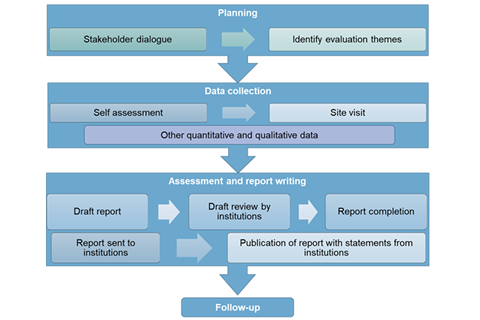Evaluations of quality in education
Evaluations are part of NOKUT’s work to assure and enhance quality in education. NOKUT conducts national, comparative evaluations of selected groups of study programmes. These will often be study programmes within a particular academic subject, but NOKUT may also conduct thematic evaluations of quality across subject areas.
Objectives for NOKUT’s evaluations of quality in education
NOKUT’s evaluations should generate knowledge about quality in education and facilitate quality enhancement. Evaluations are not designed to investigate compliance, but to identify key challenges and good practice, and to give recommendations for quality enhancement. The evaluation process should facilitate learning through the exchange of experience and knowledge, and the evaluation results are published in a final report.
Legislative framework for NOKUT’s evaluations of quality in education
The Act relating to universities and university colleges § 16-3 states that the Ministry of Education and Research can instruct NOKUT to conduct evaluations to assess the quality of higher education according to § 16-2 letter d, which specifies that NOKUT has professional autonomy in this task.
NOKUT's national evaluations fall under the national framework for the evaluation of Norwegian research and higher education and should therefore contribute to quality work at the institutions, knowledge-based policy development, a solid knowledge base for study applicants and partners, confidence in higher education in the population, and transparency in the use of public funds.
NOKUT’s evaluations are designed and carried out in line with the European Standards and Guidelines for Quality Assurance in the Higher Education Area (ESG 2015).
Based on this framework, NOKUT has developed a set of principles for our external evaluations.
The evaluation process
Below is an overview of key elements in NOKUT’s evaluation process.
Illustration of the process

